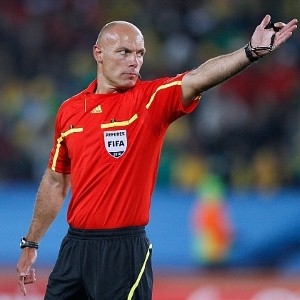By Andrew Warshaw
January 5 – FIFA President Sepp Blatter wants professional referees to be an established part of the game by the time of the next World Cup in Brazil.
A series of gaffes in South Africa last summer – most notably a disallowed goal from England’s Frank Lampard and a clearly offside goal by Carlos Tevez that, conversely, was allowed to stand – rekindled calls for better officiating at future major tournaments.
In the second part of an interview given to FIFA’s website, Blatter said it was his intention to have professional refs in place by 2014.
“We have a very clear target in this respect, and that’s to have only professional referees officiating at the 2014 World Cup,” he said.
“That’s a target we have to reach.
“Coaches are professional now and so are players, and there’s no reason why referees shouldn’t be either.
“Some people say there’s not enough money to pay them, but there always seems to be plenty in the professional leagues.”
Blatter also revealed he has asked a newly established football task force to investigate whether there should be a change to the system of three points for a win and one for a draw.
The Task Force Football 2014 is charged with suggesting ways to make the game more attractive.
“At the moment three points are awarded for a win and one for a draw, which is something we can discuss and decide whether it’s a good thing or not,” said Blatter.
“Is extra-time the only option we have when a game ends in a draw?
“And if we stick with extra-time, how should we end games?
“Is it worth taking another look at the golden goal?
“Some people like it, some people don’t.”
The Task Force is made up of football administrators, players and ex-players, referees and medical experts and was set up in the wake of last year’s finals.
Blatter says one reason the quality was so poor poor in South Africa is that there are too many domestic club games.
“Domestic championships are too long because there are too many teams and too many matches,” he said.
“Teams in leagues with 20 clubs play 38 games, on top of which they also have national cup competitions and league cups, etc.
“This also creates a conflict of interest between national teams and clubs, some of whom complain that their players come back tired or injured.
“That’s not the fault of the international calendar, however, and it’s a subject that ought to be discussed.”
Contact the writer of this story at zib.l1745290551labto1745290551ofdlr1745290551owedi1745290551sni@w1745290551ahsra1745290551w.wer1745290551dna1745290551

